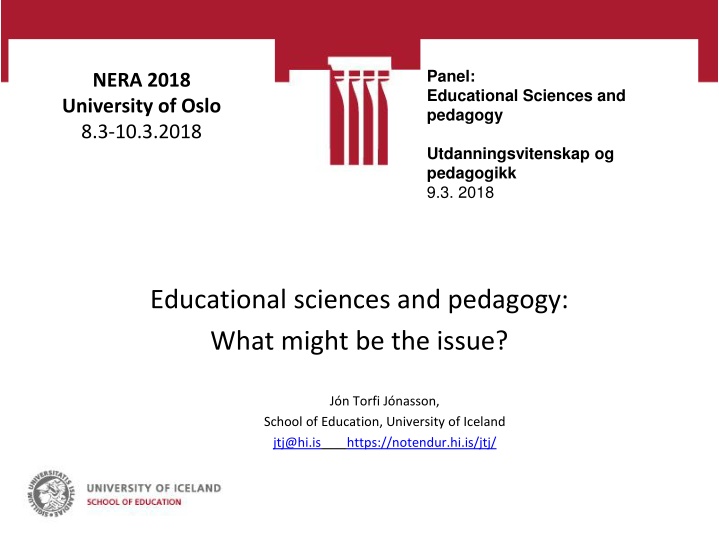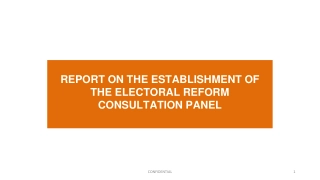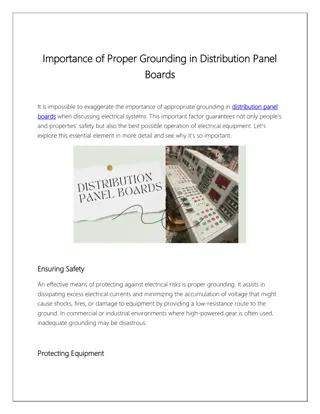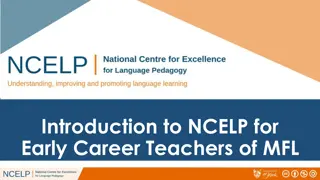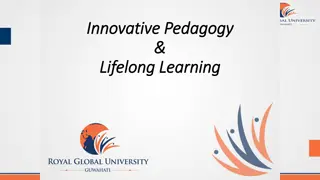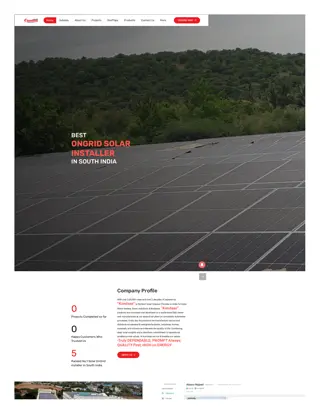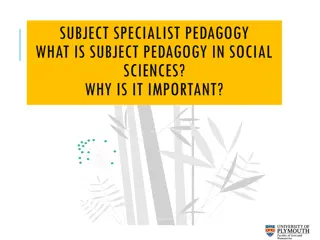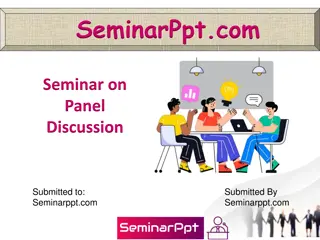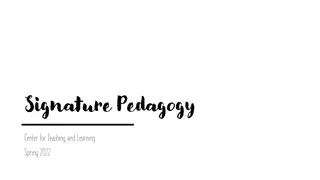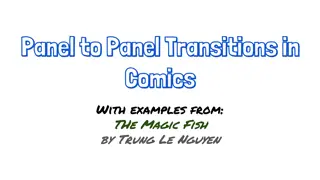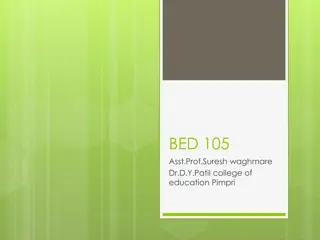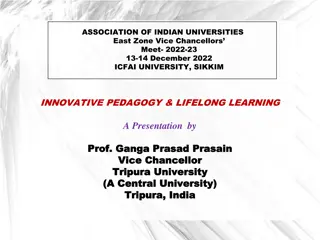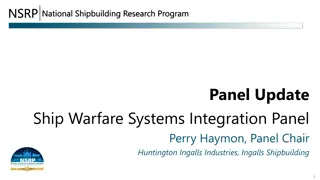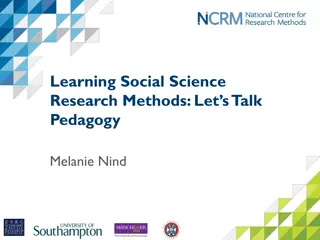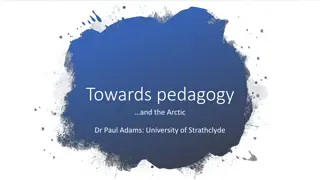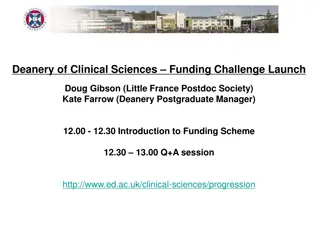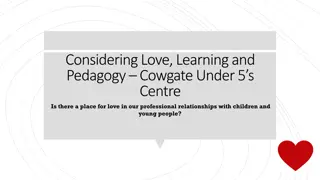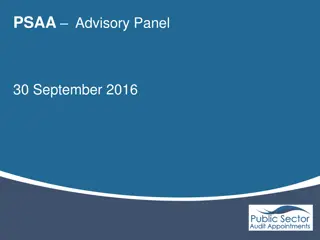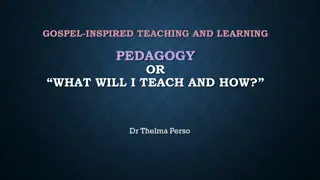Panel: Pedagogy in Educational Sciences
Pedagogy in educational sciences faces the challenge of potential marginalization, threatening its contribution to international educational research. Defined as a disciplined discussion on education's nature, rationale, and modes, pedagogy engages with values, cultures, and empirical research. The issue revolves around representing pedagogy academically, including its philosophy, anthropology, and psychology, as well as operational modes like teacher education, ethics, and professional development.
Download Presentation

Please find below an Image/Link to download the presentation.
The content on the website is provided AS IS for your information and personal use only. It may not be sold, licensed, or shared on other websites without obtaining consent from the author.If you encounter any issues during the download, it is possible that the publisher has removed the file from their server.
You are allowed to download the files provided on this website for personal or commercial use, subject to the condition that they are used lawfully. All files are the property of their respective owners.
The content on the website is provided AS IS for your information and personal use only. It may not be sold, licensed, or shared on other websites without obtaining consent from the author.
E N D
Presentation Transcript
Panel: Educational Sciences and pedagogy NERA 2018 University of Oslo 8.3-10.3.2018 Utdanningsvitenskap og pedagogikk 9.3. 2018 Educational sciences and pedagogy: What might be the issue? J n Torfi J nasson, School of Education, University of Iceland jtj@hi.is https://notendur.hi.is/jtj/
The challenge As such, pedagogy as a research discipline has been placed under educational sciences as interdisciplinary in its character. Thus, pedagogy runs the risk of being marginalised, whereupon the discipline s contribution to a vivid and holistic international educational research is under threat. J n Torfi J nasson NERA Oslo 2018 Panel 2
Pedagogy To my mind pedagogy refers to a disciplined discussion about the nature, the rationale for and the different modes of education. It engages with values, ideas and ideals, cultures, institutions, empirical research and data of many sorts. As a discipline engaged both with research and the development of professionals, pedagogy has to have a clear focus on its fundamental tasks and be true to its mission. I will present schematically my basic ideas, first about the academic discipline and some of its foci and relationship to other disciplines and second about the framework for education of teachers (or all dedicated professionals in educational institutions). J n Torfi J nasson NERA Oslo 2018 Panel 3
How to represent the issue or question? Pedagogy as an academic arena or discipline Pedagogical systems or operational modes The discipline of pedagogy, the why, what and how of education Pedagogical cultures, ideas, history Pedagogical philosophy Pedagogical anthropology Pedagogical sociology Pedagogical psychology J n Torfi J nasson NERA Oslo 2018 Panel 4
Pedagogical systems or operational modes education of the relevant professional workforce Leisure competence Teacher education for schools Adult education Pedagogy, the why Pedagogy, the what Work place learning The infrastructure of education Pedagogy, the ingredients and how Pedagogy of ethics Professional development Pedagogy of Pedagogy of mathematics: what and how Pedagogy of Pedagogy of natural science what and how Outdoor pedagogy 5 J n Torfi J nasson NERA Oslo 2018 Panel
Pedagogical systems or operational modes education of the relevant professional workforce Leisure competence Teacher education for schools Adult education Pedagogy, the why Pedagogy, the what Work place learning The infrastructure of education Pedagogy, the ingredients and how Pedagogy of ethics Professional development Pedagogy of Pedagogy of mathematics: what and how Pedagogy of Pedagogy of natural science what and how Outdoor pedagogy 6 J n Torfi J nasson NERA Oslo 2018 Panel
Is science the answer? Or when is science the answer? In our societies there is a consensus that education is a precondition for the good function of a modern society and its development. Also that the schools are our major vehicles to ensure its potentially good effects. It is also clear that our societies and their cultural and physical environments change at a formidable pace. Even some technological developments are affecting our lives in fundamental ways. All of these changes seem to cry out for a profound discussion about how education should play its role in a changing world. Nevertheless we seem to be practically unable to engage in the central discussion of what its underlying aims should be and consequently to what extent these should change from the time-honoured traditions. Even more importantly, how its ingredients might or should be totally revamped. This discussion should be placed in centrum of the educational edifice rather than marginalised as it has been (for a number of reasons). The main problem is that by placing our trust in the culture and modus operandi of the sciences we are locked in a world that is generally uninterested in and even unable to address the challenge of where education should go. The scientific arena does not focus on the most important part of the educational discourse. J n Torfi J nasson NERA Oslo 2018 Panel 7
Thus, what is the question? Is it mainly about how we talk about education as an important arena of our social world? Which certainly reaches far beyond the school system. The number of networks within educational associations, such as NERA, EERA etc. clearly shows how multifaceted the discussion is. Or is it about how we talk about two related institutional settings, i.e., our schools and how we prepare the professionals who work there? Among the problems here is that both settings are probably seriously outdated and there are no clear signs that science , educational or otherwise is currently helping to remedy this. This is not meant to belittle in any way the importance of the discipline and transparency science and data brings. But they have two curiously problematic features, i.e., conservativism, and lack of commitment to a cause, that pedagogy is more likely to have. J n Torfi J nasson NERA Oslo 2018 Panel 8
Thank you Thank you J n Torfi J nasson NERA Oslo 2018 Panel 9
The challenge Three perspectives from which I will attempt to address this challenge The definitional challenge the linguistic issue. The hegemony of the natural science discourse. What are the important questions in education and how do we address them? Plus the crucial question: Where is there a place for pedagogy? For what? And where should it be placed in the world of academic disciplines J n Torfi J nasson NERA Oslo 2018 Panel 10
The definitional challenge the linguistic issue Terminology is undisciplined, e.g. in the educational discourse Literacy, - as in PISA measures reading literacy, - but also terms as: subjects, informal education, adult education, quantitative research, assessment for learning, inclusion, school-leaving, far from a consensus within the field. Different cultures invite different understanding and usage of similar terms Education in England, France, India, Russia and USA. Alexander, Robin J. (2000). Culture and pedagogy : international comparisons in primary education. Also pedagogy and science have different connotations in different cultures. Note how the h gskolar, h yskoler, h jskoler all use the English term university. Different languages use different terms Different terms for education, in the Nordic, German, English, languages in Icelandic we use menntun , which is understood as being literate, but more specifically, more human , and perhaps most kindred to dannelse. We have of course the plethora of terms related to pedagogy, didactics, . J n Torfi J nasson NERA Oslo 2018 Panel 11
The hegemony of the (natural) science discourse. How the natural sciences have gradually taken over academic discourse, defining what is legitimate within academia (or within the purview of the scientific discourse) The natural, or perhaps the empirical disciplines, define how to operate and what language to use, but also what is worth doing. Thus it is decided what is acknowledged, rewarded and given status and e.g., what is called science. The academic discourse drift (analogous to the academic institutional drift in HE) Thus the social sciences, including a part of the educational field, and even the humanities, have to succumb to this mode of talking. The hegemony of traditional academic subjects (partly stemming from the traditional liberal arts) What is allowed as a subject? The status of interdisciplinary subjects. What does it take to become a bona fide academic subject? J n Torfi J nasson NERA Oslo 2018 Panel 12
What are the important questions in education and how do we address them, e.g. in teacher education? How to educate teachers? What do we discuss within education? Who should run the school system? Who should be held accountable and on what basis? Can we use schools to fight inequity? Can we use schools to alleviate mental problems? What to teach? How to teach? What should be the ingredients of education? Or, what is education all about? How do we decide? J n Torfi J nasson NERA Oslo 2018 Panel 13
References and literature Alexander, R. J. (2000). Culture and pedagogy : international comparisons in primary education. Oxford: Blackwell. Alexander, R. J. (2008). Essays on pedagogy. London: Routledge. Collins, A. (2017). What's worth teaching? : rethinking curriculum in the age of technology. New York, NY: Teachers College Press. J nasson, J. T. (2008). Inventing tomorrow s university. Who is to take the lead? Bologna: The Magna Charta Observatory. J nasson, J. T. (2016). Educational change, inertia and potential futures. European Journal of Futures Research, 4(1), 7. doi:10.1007/s40309-016-0087-z Kemp, P. (2015). L gnen om dannelse : opg r med halvdannelsen : en pamflet. Kbh.: Tiderne Skifter. Moos, L., & Kemp, P. (2017). Dannelse : kontekster, visioner, temaer og processer (1. udgave. ed.). Kbh.: Hans Reitzel. Murgatroyd, S. J. (2011). Rethinking Education. Learning and the New Renaissance: Future Think Press. Reimers, F. M., & Chung, C. K. (Eds.). (2016). Teaching and Learning for the Twenty-First Century Harvard Educational Publishing Group. S fstr m, C. A., & Saeverot, H. (2015). Debatt:. Att skada pedagogisk kunskap. Striden om l rarutbildning i Sverige och Norge. Pedagogisk Forskning i Sverige, 20(3-4). Zgaga, P. (2013). The future of European teacher education in the heavy seas of higher education. Teacher Development, 17(3), 347-361. doi:10.1080/13664530.2013.813750 J n Torfi J nasson NERA Oslo 2018 Panel 14
Thus I would like to move the focus of the educational discourse To what might or should be the principal ingredients of modern day education Is science (in particular educational science), by virtue of method or discipline helpful to find the answer? How do we address this question? How far are the schools able to respond to the challenges this poses How do we furnish the schools in order to enable them to respond? J n Torfi J nasson NERA Oslo 2018 Panel 15
Additional pedagogical issues Education, and thus educational discourse, must define its own characteristics and boundaries: E.g. School subjects, are not university subjects? Nevertheless they demand powerful knowledge by the teachers Educational assessment and measurement have huge validity problems that are normally overlooked Schools have their own organizational and institutional cultures and characteristics. They are different because of their educational character Professional development in education has its unique features and challenges . J n Torfi J nasson NERA Oslo 2018 Panel 16
The power of science and research: Case closed - and opened Research: I take it as a premise for my discussion that it is absolutely vital for the global society, and its parts, to foster research. Research enlightens, explains, informs, inspires, debunks myths, opens up new venues and perspectives, simplifies, when things seem hopelessly complex - but also shows complexities and connections that were not seen before and research often suggests problems or deficiencies in what we have been doing (or have neglected). Research is the alpha and omega of progress. Data - evidence: I also take it for granted that when taking most decisions within the public sphere, we demand that they are informed, based on a careful collection of data which is guided by the rules of science. This ensures that the decisions are transparent, balanced, deliberated and neither whimsical nor capricious, idiosyncratic, politically biased nor self- serving. Any decision that affects the equity between students, their progress or current or future well-being shall be based on data. Data, can be inspiring or motivational, it can charter progress being made and seems also to be necessary to enable us to place trust in a system which must demonstrate that it functions well by using solid data. Thus there can hardly be any doubt that we should relentlessly concentrate on fostering both research and the use of data evidence in education it is the unquestioning respect for the scientific approach. This is the elixir of progress. The more the better. There cannot be any debate, the case seems to be closed? Get going! J n Torfi J nasson NERA Oslo 2018 Panel 17
A general background to the main issues: Not quite But it can be argued that this is far from being a closed case: The ethos of science - that we cherish - can be rather merciless in demanding critical analysis of methods and concepts and the way we ask questions, collect data, interpret them and use. Thus when we turn the search light of science on itself, it reminds us that despite its importance, science cannot do everything, inter alia may neither be able to answer some of the most important educational questions nor give us all the guidance we may be set to expect from science and rigorous data. Even if we leave aside the complications that arise when defining the central concepts (research, data, evidence, good education, achievement, progress, ) and also a host of technical (methodological) problems when doing research or collecting data which are there, of course, but often ignored, - we still face a number of even more difficult questions or issues to deal with. So the case is wide open again. J n Torfi J nasson NERA Oslo 2018 Panel 18
